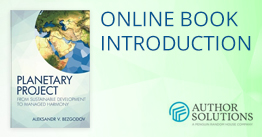From Sustainable Development To Managed Harmony: A Paradigm Shift

26/07/2016
Despite its theoretical solidity and international recognition, the concept of sustainable development has run into fundamental implementation issues. Internal contradictions are revealed both in its ideological-methodological frame. Its global mission to lay out the foundations of a new type of civilisation that would adapt people to the environment has not been fulfilled. Global problems have accumulated a critical mass. There is not much time left before the Earth’s life-subsistence resources are irreversibly exhausted. Radical and efficient solutions based on an anti-crisis economic model are necessary.
It is clear that the concept of sustainable development should not be discarded as it has so many true points, correct principles, and promising proposals. It is just that they require re-working, which should be based on constructive criticism and a shift of modelling focus. For instance: the categories of “progress” and “development” require conceptual review; while the terms “sustainable development indicators” and “the quality of life” need a systemic detailed overview; and there has to be a total re-evaluation of the notions of “biocentrism” and “humanism”. The environmental imperative and biocompatible ethics should be filled with concrete and accessible meaning. The main thing, however, is to develop an organisational basis and resource mechanisms of global human integration and global problem solving to avoid the situation when they remain delusionary projects.
This work must start where a gap is found in the Concept of Sustainable Development, and where the Sustainable Development Strategy has lost its way. Still, correct ideas have allowed the adequate formulation of what should be done and when; while how, who and with what resources remain the weak link in the argumentation of sustainable development followers. To address these issues, we propose our own comprehensive ideology and methodology referred to as the Planetary Project.
Since its outset in 2006, the Planetary Project has developed as a new and realistic model of solving global problems, as a concept of global human unification, and a civilisation paradigm. Initially, it emerged as a critique of the concept of sustainable development: as discourse of correcting and augmenting some of its points. At some stage it grew into a theory of re-globalisation, a planetary modelling alternative to the “golden billion” format. It took a certain focus shift.
It is impossible to solve global problems, and remove or alleviate global contradictions, most of which lie in the economic dimension or at least are rooted in it. Therefore, we saw real possibilities of radical solutions in revising the notions of planetary resources, planetary property, planetary rent, and the re-distribution of income from it.
Indeed, what has become the barrier for international attempts to implement sustainable development strategy? They include:
1) a conflict of interest in the process of discussion and resolving global problems (along the following juxtapositions “global–national”, “international”, and “national–regional–local”)
2) a lack of scientific and technological solutions;
3) ideological and value contradictions between global players and the absence of a single platform for the understanding and evaluation of global problems.
The Planetary Project proposes the following basic hypotheses to be substantiated through practical activity:
- resolving global problems of the contemporary world is extremely difficult and costly, but possible, provided these are in place: an adequate resource base, material means, clear planning, correct organisational scheme, and a realistic financial mechanism;
- reducing disunity between nations to the level when it does not present obstacles to global integration is possible provided wealth distribution between agents of planetary development is fair;
- creating a compromise-based model of civilisation, whose terms are acceptable for people of different cultures, is possible;
- developing necessary scientific and technological solutions, which meet the standards of the Sixth Techno-economic paradigm, is possible;
- coherent modelling of instruments of solving global problems and global human integration is possible within the Planetary Project;
- we can completely rely on support for the Planetary Project from the progressively minded international and national elites if we present to them a well-argued justification for the degree of their interest, participation, and responsibility.
The Planetary Project philosophy is constructed along the following lines:
- identifying the most important global problems;
- recognising their fundamental resolvability;
- proclaiming the planetary scale of the activity, and the necessity for global human unification;
- formulating basic hypotheses;
- formulating key principles of planetary integration;
- recognising the possibility of creating a single human civilisation able to develop in harmony with nature;
- determining mechanisms of global problem solving and planetary integration;
- forecasting and programming prospects of planetary civilisation according to the new evolutionary scenario.
The purpose of the Planetary Project is to solve global problems threatening the present and future of humanity. We believe that the following problems are the most important and urgent today:
- poverty, unemployment, social inequality and social injustice;
- starvation, undernourishment, deficit of fresh water and food as well as its poor quality;
- threat of a nuclear war and the proliferation of weapons of mass destruction;
- climate change;
- environmental crisis and environmental degradation;
- rising deficit and non-renewable depletion of natural resources;
- spread of existing and new mass diseases (including infectious and viral);
- terrorism and local wars;
- international crime.
The ideology of the Planetary Project is based on the premise that global problems are essentially solvable only if the following conditions are met: a shared understanding of problems; recognition of the fact that problem solving should be based on the balance of interests of all parties; a reliable organizational and financial scheme; and co-operation of united agents. The main thing is that global problems can only be solved on a planetary scale.
We purposefully use the notion of planetarity in both the name of the project, and in the terminology about its vectors, content, goals and specific objectives. There are two reasons for doing this: firstly, its scale indicating the cosmos character of the Earth, the biosphere, humanity and man; and secondly, to get away from the odious notion of globalism. Unfortunately, globalism causes negative associations in many people, because it has been discredited by the opponents of globalisation and the “golden billion” ideology. “Planetarity” does not just have a purely mathematical meaning of the maximum imaginable calculable amount of the Earth’s objects, including organic and non-organic matter as well as primitive and highly organised life. It is also representative for the understanding of evolution as a cosmogonic process in which integral people can play an active part. Planetarity is a form of existence in which any division between people is removed and loses its meaning and significance.
From the Planetary Project perspective, resolving global problems and global human integration are key conditions for human survival. The emergence of planetary humanity as a new agent of history and evolution can only be possible if some fundamental principles are applied that derive from the analysis of the work of the United Nations, the world’s integration practices, and historical experience.
The Planetary Projectgeneral principles are as follows:
- preserving the health of the biosphere, resource saving, and use of alternative resource substitutes are of priority importance for the world community;
- equality and equal rights for all races, nations, cultures, religions, states, and other forms of social organisation are postulated as part of the human integration process, with the exception of those that harm the biosphere, violate people’s rights and freedoms and limit the possibilities for people to coexist with nature in harmony;
- forming a planetary institutional infrastructure, which will be a system of supra-national planetary governance organisations, is necessary for solving global problems of civilisation integration and world design harmonisation;
- for this, it also makes sense to develop public diplomacy and civil control over official international organisations;
- national, regional, continental, and international elites become active participants, drivers, and agents of re-globalisation (in effect, planetary development agents), which view re-globalisation as an attractive investment project; they contribute to the development, financing, and practical implementation of social, economic, and political planetary programs of harmonious development of a unified human civilisation.
Using the concept of harmony in our socio-economic construction and historical-civilisation modelling, we are completely aware of the risk of being accused of idealism or even utopianism, at least by skeptics and pessimists. Nevertheless, we think that this notion is sufficiently scientific and theoretically sound to use as a basis for a social development theory. Moreover, it meets the criteria and reflects the nature the Planetary Project because, as a philosophical category, harmony implies consonance and balance of diverse and even opposing elements as many in one. The word, harmony is of Greek origin, and it carries the idea of integral wholeness of all living things in the cosmos. This can be possible only due to the internal reasonable order that is capable of being grasped by the human mind. Harmony keeps things in wise agreement in the world. This agreement is accessible to human understanding, and is the opposite of chaos.
Today, it may sound idealistic to talk about the possibility of harmonising the relationship between people and nature and social development harmony in noospheric unity format, when the world is wrought with a multitude of fundamental contradictions. Pessimistic experts predict escalation and even collapse in regard to some global problems, which can result in the death of humanity, the biosphere, and the Earth itself. The authors of the Planetary Project consider themselves scientific optimists: we believe in the reason and spiritual power of people, in their ability to make sense of their needs and regulate them. Today, there is hardly any other scenario for people than an integration one. In this case, however, as perhaps in any other mega-project to be implemented in market conditions based on the similarity and conflict of interest, everything depends on the “price tag”. In other words, it has to do with the costs involved and the financial mechanism of the entire work cycle ranging from designing and approval to implementation and quality control.
It is important to understand that we do not separate environmental and social-economic issues, because we believe that only successful economic transformation both in terms of production technologies and in terms of the distribution system can fundamentally change nature management policy, and relieve the ecosystems of excessive pressure. The key force, which is capable of kick-starting the movement processes towards the designated goal and achieving it, is the collective scientific intelligence and the planetary goodwill of our contemporaries world over. It is the manifestation of the noospheric potential of current generations. To do that, we must use the resources of natural and intellectual assets held in planetary ownership. This movement should meet the interests of the biosphere objectified in the environmental imperative, the Planetary Project’s basic principles, and the ideas of harmony known to us from the time of Pythagoras. Therefore, the vector from sustainable development to managed harmony will be most relevant to characterise the Planetary Project goal. We used to talk a lot about the necessity for a person to develop his or her personality in a harmonious way. Today, we talk as much about the necessity to harmonise relations between different nations and ethnic groups as well as the relationship between people and nature, with a concept of harmonious economic management in the works. In this sense, we can say that the Planetary Project Concept of Managed Harmony is a natural revision of sustainable development ideas from the point of view of social scientists and economists.
The idea of harmonizing world development must include not only the reconciliation of ethnic and national values, i.e., social reference points, with industrial development as an economic process, but also saving the environmental balance as social responsibility to future generations. Harmonising planetary processes as a comprehensive and highly complex task requires the use of scientific findings in various fields; therefore, we must involve planetary research scholars and specialists who have achieved interesting and promising results.









